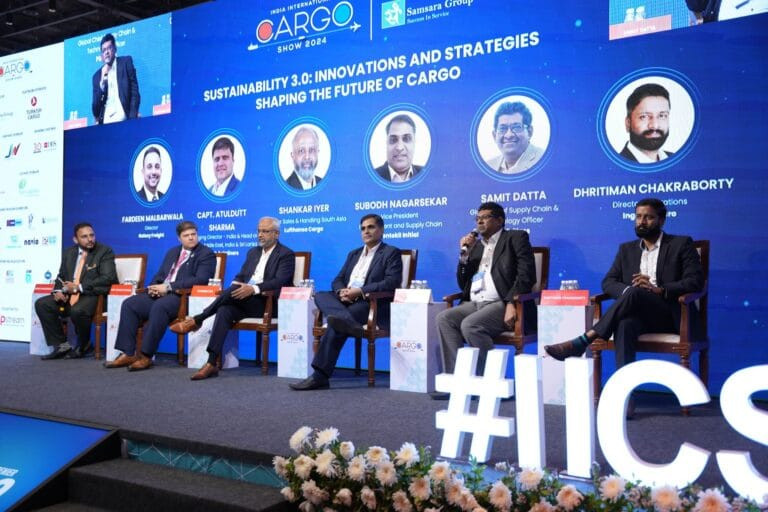As the air cargo industry expands, so does the complexity of security risks. From cyber threats to physical vulnerabilities in ground operations, ensuring the safety of cargo is a critical priority.
Fletcher Samuel, AGM – Cargo Business at Bangalore International Airport, highlighted the importance of adopting advanced technologies to address these risks: “Security in air cargo is no longer limited to screening processes. We are integrating AI-powered threat detection systems and blockchain for secure documentation.
“These technologies enable us to pre-empt potential threats and maintain the integrity of cargo throughout its journey.”
Regulatory compliance
Stringent regulations, though necessary for safety and transparency, often create bottlenecks in air cargo operations. Compliance with international standards such as ICAO and IATA, as well as local requirements, remains a challenging task for industry players.
Prasad Gengusetti, Chief Operating Officer at GMR Hyderabad Air Cargo, spoke about the importance of adopting a proactive approach to regulatory compliance: “Regulations are not just hurdles; they are opportunities to streamline processes and build customer trust.
“By investing in digital platforms for Customs clearance and compliance, we have significantly reduced turnaround times while ensuring full adherence to regulatory requirements.”
Capacity constraints
Capacity challenges have become more pronounced with the rise of e-commerce and the growing demand for time-sensitive shipments.
Gagan Gupta, Vice President – Cargo at Air India, discussed strategies to address these issues: “Air cargo capacity is a finite resource, but with better planning and optimisation, we can maximise its potential.
“We are investing in widebody aircraft, freighters, and advanced cargo management systems to improve load factors and reduce empty space in shipments.”
Industry-specific challenges
The pharmaceutical and chemical sectors, which rely heavily on air cargo for transporting temperature-sensitive and high-value goods, face unique logistical challenges.
Vijay Shetty, Senior VP – Global Distribution & Supply Chain at Alkem Laboratories, emphasised the importance of cold chain solutions: “For pharmaceuticals, maintaining the cold chain is non-negotiable.
“We are deploying IoT-enabled sensors and real-time tracking to ensure that temperature-sensitive products reach their destinations in optimal conditions.”
Bharat Bhushan Rathi, Head of Distribution and Logistics at Mankind Pharma, echoed these sentiments by adding: “Pharmaceutical logistics requires precision and compliance with global standards. Innovations like AI-driven route optimisation and automated warehouses are helping us meet these demands while reducing costs.”
Meanwhile, the chemical industry faces additional challenges related to hazardous material regulations. Bhupendra Kumar, Head of Logistics at IOL Chemicals and Pharmaceuticals, shared insights on managing these complexities: “Transporting chemicals involves stringent safety protocols. By using blockchain for secure documentation and AI for predictive maintenance, we are ensuring compliance while minimising risks.”
Leveraging Technology for Efficiency and Resilience
From advanced cargo management systems to predictive analytics, digital tools are enabling stakeholders to enhance efficiency, reduce costs, and improve customer satisfaction.
Ashish Asaf, Group Managing Director & CEO of S.A. Consultants & Forwarders, highlighted the need for industry-wide digital adoption: “Digitalisation is not just about adopting new tools; it’s about creating an interconnected ecosystem.
“Platforms that integrate data from shippers, forwarders, and carriers are helping us achieve better visibility and coordination across the supply chain.”
Collaboration and Future Outlook
While technology and innovation are crucial, the panel emphasised that collaboration across the air cargo ecosystem is equally important for long-term resilience. Airports, airlines, logistics providers, and regulatory authorities must work together to address common challenges and drive the industry forward.
“Collaboration is the cornerstone of a resilient air cargo industry,” Gupta said. “Whether it’s sharing data, aligning processes, or co-developing technologies, working together ensures that we are better prepared to face future challenges and practices.:
Building a resilient ecosystem
The air cargo industry is at a critical juncture, facing challenges that require innovative and collaborative solutions. By integrating advanced technologies, streamlining regulatory compliance, and optimising capacity, stakeholders can build a more resilient and efficient air cargo ecosystem.
As Samuel aptly concluded, “Air cargo is not just about moving goods; it’s about connecting people, businesses, and economies.
“By addressing today’s challenges with innovation and collaboration, we are laying the foundation for a stronger, more sustainable future.”




